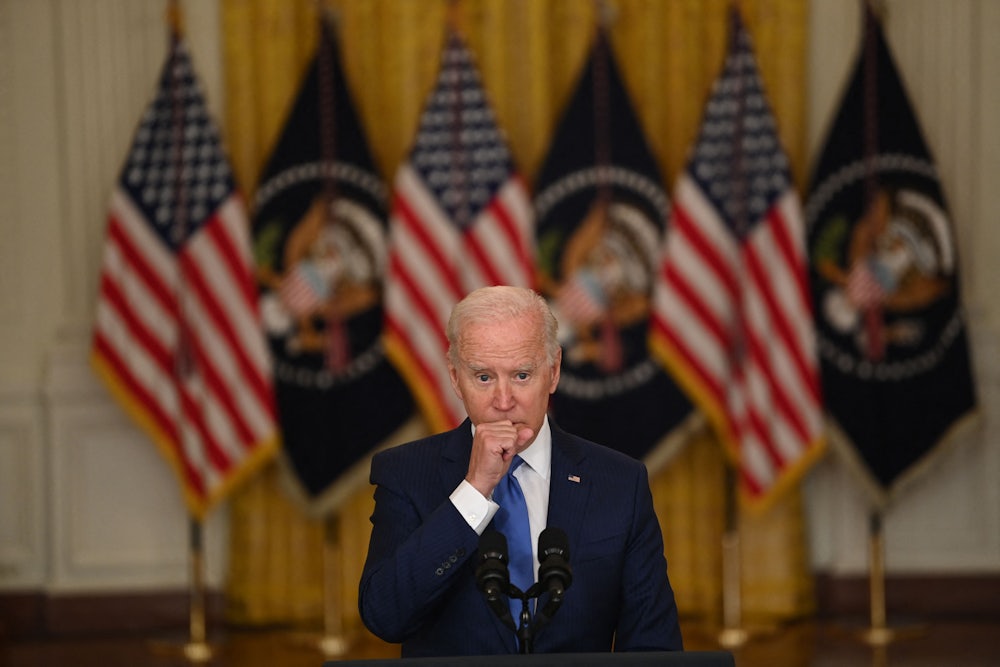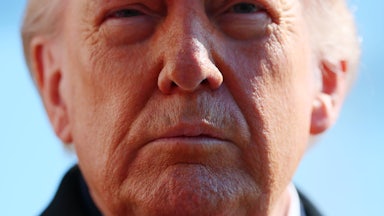If ever there was a reliable constant of Joe Biden’s campaign and presidency, it’s been his habit of invoking the middle class. In his most recent State of the Union speech, Biden said he and Vice President Kamala Harris have sought to “build the economy from the bottom up and the middle out, not from the top down.” Two days ago, in a statement on his new 2023 budget proposal, Biden promised the plan would “grow the economy from the bottom up and the middle out.” During his most recent run for president, Biden often took time in debates and public remarks to lament the struggles of the middle class. In a late-2019 debate, when the discussion veered to the economy, Biden warned, “The middle class is getting killed. The middle class is getting crushed. And the working class has no way up as a consequence of that.”
The sensible conclusion would be that two years of consistent messaging from Joe Biden would yield a strong association between the leader of the Democratic Party and president of the United States and how he prioritizes the middle class. But new polling obtained exclusively by The New Republic shows Americans actually associate the middle class more with the Republican Party than with the Democratic Party.
The polling was done as part of an effort to fix the problem for Democrats. A coalition of groups have set up a 501(c)4 nonprofit campaign to change that perception in key congressional districts. The new nonprofit campaign, called Unrig Our Economy, is planning on spending $5–$7 million this year nationally and in four moderate Republican House districts to change the perception that Republicans, not Democrats, are the party of the middle class.
Their spending in those four districts—New York’s 11th congressional district, California’s 22nd congressional district, Iowa’s 2nd congressional district, and Nebraska’s 2nd congressional district—is based on the research obtained by TNR. Outside group spending is a dime a dozen in an election year like 2022, and this is hardly a huge spend by modern standards. But what makes this different is the group’s findings and mission. The top lines of the group’s findings are revealing. They say:
· People trust Democrats more on ensuring people/corporations are paying their fair share, fighting inequality, fighting special interests.
· Republicans are trusted more on valuing hard work, fighting inflation, creating jobs, and looking out for the financial situations of people like me.
· The middle class message we tested—“When the middle class does better, America does better”—was the top performing message across nearly all audiences. However, respondents associated this message, and the mere phrase “middle class,” more with Republicans.
· The “rigged economy” message was the top-testing message of those that respondents associated with Democrats. It was popular among Independents, Democrats, college-educated white voters, Hispanic voters, and AAPI voters.
The news from the survey gets even worse. The poll tested 13 different types of messages, 11 of them crafted as Democratic messages and two of them representative of Republican messages, about Americans “being able to work hard and succeed” and arguing that “people do better when taxes are low for all Americans instead of going to Washington politicians and wasteful government spending.” The first Republican message was the top-performing statement. Two top statements in the top five were associated with Democrats. Those were, “When the middle class does better, America does better”; “Wealthy corporations have manipulated the political system so it’s rigged in their favor—they pay less than they should and everyone else pays the price”; and finally, “We need to bring back the promise of the American Dream, and help our middle class succeed.”
“I think it shows a need for continued communication and making sure that people are hearing the message that Democrats have been talking about and to make sure that they’re hearing the contrast between where Democrats are and where Republicans are,” Democratic pollster Margie Omero, whose firm GBAO conducted the poll, said.
It’s a remarkable finding. Ask any rank-and-file Democratic activist whom their party is trying to look out for most, and they will say the poor and the middle class. The Democrats’ messaging is almost relentlessly economic. Republicans, more often than not, will focus on the importance of liberty over tyranny and fighting out-of-control government. The findings indicate that despite an endless amount of crowing by party leaders about looking out for the middle class, a disturbing portion of voters don’t associate the Democratic Party with that.
“Ultimately the intrinsic value of work is sort of the key part of all this,” Democratic strategist Jesse Ferguson fretted to me in an interview on Monday. “Republicans have given tax breaks to the wealthy, taken their campaign contributions, and then told a storyline of being for hard work, and too many people have bought it.”
The worst-performing statements were on unions, corporate taxes, inequality, and corporations getting too big.
Unrig Our Economy is using the survey’s findings to argue that Democrats need to take a more aggressive, progressive message to try to change the perception of who voters think is more focused on helping the middle class. The group plans to run a paid and grassroots organizing campaign based on its findings.
“As we’ve been touting it, we haven’t been building any long-term credibility around the economy, which is ultimately how people make a lot of their decisions as to who they want to represent them,” Sarah Baron, Unrig Our Economy’s campaign director, said. “So obviously something isn’t working, and our message isn’t sinking in. So what I think this poll both affirms, and what the point of this campaign is, we need to go on offense with a progressive populist economic message. We can’t just keep saying the same thing, just trying to say it louder and hope that we’re somehow going to change things and turn things around.”
The four districts Unrig Our Economy is targeting are all swingier districts. They are also for the most part working-class districts. Conceivably, even in a bad year like this looks to be for Democrats, they could flip from the red team to the blue team. Congresswoman Nicole Malliotakis represents New York’s 11th congressional district, based in Staten Island, having beaten Democrat Max Rose in 2020. Congresswoman Mariannette Miller-Meeks represents Iowa’s 2nd congressional district, having beaten Democrat Rita Hart by fewer than 10,000 votes in 2020. Before that, Democrat Dave Loebsack represented the seat for over a decade. Republican Don Bacon represents Nebraska’s 2nd congressional district, having held onto the seat since 2016. Prior to that, Brad Ashford held the seat and tried to retake it in 2018 but lost in the Democratic primary. California’s 22nd congressional district covers parts of Fresno and the San Joaquin Valley. It is currently represented by Congressman Dan Valadao, who wrestled the seat away from Democrat T.J. Cox in 2018. Previously, Republicans had held the seat for 36 years.*
“The voters in these districts are
the type of voters we’re trying to reach, writ large, across the country as
well,” Baron said. She added the group knows “this is going to take several
years,” and its initial spending plan is for this year.
The organization is hosting a virtual kickoff event with Oregon Senator Jeff Merkley and Illinois Congresswoman Jan Schakowsky on Wednesday. Its board includes the heads of influential liberal economic groups like the Groundwork Collaborative, Americans for Tax Fairness, and the Economic Security Project.
All of this is to reinforce, essentially, what Biden has staked his entire domestic policy agenda on: helping the middle class. That’s the core intent of his Build Back Better domestic spending package. It’s what he likes to talk about in every domestic policy speech he can. He clearly wants to help voters in the middle class, even if those voters don’t know he’s the one trying to help them.
* This article originally mischaracterized the election history of the district.










